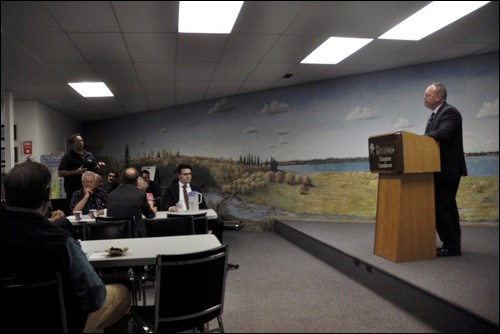Finance Minister Kevin Doherty faced some tough questions at the Battlefords Chamber of Commerce post-budget breakfast Wednesday.
The post-budget breakfast came exactly one week after Doherty delivered the provincial budget in the Saskatchewan legislature. There were not too many surprises in his address to those in attendance, as Doherty reiterated the key points of what was a $434 million deficit budget.
But it was the budget’s decisions on funding cuts, and the beginning of its much talked-about government-wide “transformational change,” that prompted most of the questions from the floor.
One of the questions was about the cut of funding to municipal parks including the Battlefords River Valley. The province had funded 50 per cent of the river valley, with the municipal governments of Battleford and North Battleford on the hook for the other 50.
North Battleford councillor Ryan Bater questioned Doherty on the decision to pull that funding, pointing out funding in Saskatoon and Regina “wasn’t totally cut.'
“Why the double standard between communities like ours and Saskatoon and Regina who are not cut totally and not cut immediately?” Bater asked.
Doherty responded that he was asked the same question in Moose Jaw. It “wasn’t an easy decision for any of us,” he said.
“Given the fact that we were facing some significant shortfalls in revenue, given the fact that the Ministry of Health made compelling cases as to what we need to provide funding for, what is the provincial government’s core services. This is part of transformational change, what ought we be involved in?”
He noted he had a “whole list of things we’ve been involved with across the province” that were outside the purview of the provincial responsibility.
“What is our responsibility to provincial taxpayers? I would argue health care delivery is our primary responsibility,” said Doherty.
With respect to Saskatoon and Regina he acknowledged it was a “valid point” but noted there are contractual obligations through “statutory and legislative responsibilities” for the two parks there — Meewasin and Wascana. As well, there are lands owned by the province in Wascana, the municipality and the university, as they are in Meewasin.
“It doesn’t mean we’re not going to make a move on Meewasin Valley or Wascana Centre authority,” said Doherty.
He also acknowledged some would be unhappy with the budget’s cuts, but added “something’s got to give. We’re dealing with a $434 million deficit.”
“The only thing I can control other than raising your taxes … is the spending side.”
Doherty was also asked about “transformational change.” In his speech, Doherty tried to address fears about what it might mean.
“We ought not to fear transformational change,” Doherty said. “What we ought to embrace is the fact that government should be asking these kinds of questions.”
In speaking to the News-Optimistafterwards he expanded on it more.
“It’s taking a look at every expenditure across government,” said Doherty. “It’s also taking a look at the revenue side of government. Are we delivering the best possible services, the core services, that provincial government ought to be delivering to the citizens of this province in the most cost-effective and cost-efficient manner possible?”
In his speech, he said it was incumbent upon government to ask questions to find out “is there a better way to do this. Because with the volatility in our resource revenues, if this is the new normal, it’s not sustainable - unless we want to run deficit after deficit after deficit.”
Another issue raised at the breakfast was the $8 million required for furniture and equipment at the new Saskatchewan Hospital, money that must be raised locally. A fundraising effort is underway and Prairie North Health Region CEO David Fan has already approached North Battleford council for financial help to cover some of that cost.
Battleford mayor Derek Mahon wanted to find out if there was somewhere to go to “see the actual agreement and the cash flow schedule that’s attached over a number of years.” Mahon also suggested that $8 million should have been covered in the overall construction cost.
“Maybe it should have been included. This is a provincial hospital that serves the whole province.”
Doherty did not have an immediate answer for Mahon and pledged to get that information to him.
In speaking with the media afterwards, Doherty reiterated the view that running a deficit was justifiable, indicating the province did not want to hike taxes or do extensive program cuts.
“We want to send a message to investors, to the business community, to individuals, the citizens here in the province, that now is not the time to be raising taxes to solve what we think is a temporary problem on the commodities side,” said Doherty.
“Temporary could be a year, two, three years kind of thing. But we don’t want to shock the economy any further by raising taxes, which we’ve seen other provinces do going through similar circumstances.'
He also noted that funding had gone up to the “major priority areas” such as health care, education and social services.
“Maybe not to the level some people would like,” Doherty said. “But the fact of the matter is in a tough economic circumstance with respect to losing a billion dollars in resource revenues over the course of one year, we are able to find dollars to increase spending in those major priority areas.”



